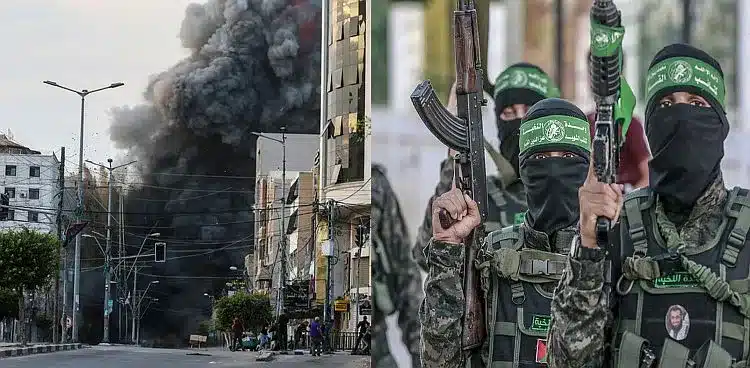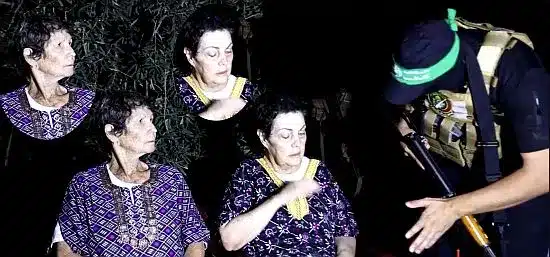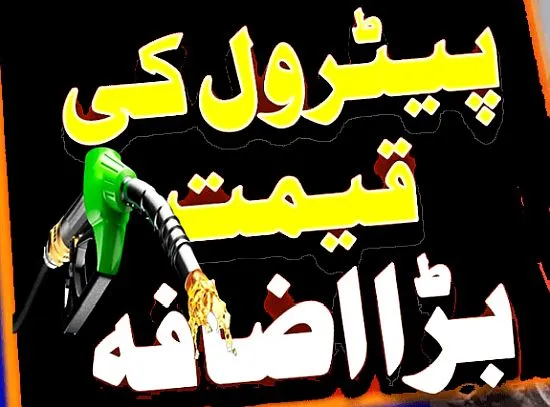Politics Shifting make India a hotbed for Israel and Hamas war misinformation
Politics Shifting Make India a Hotbed for Israel and Hamas war
On October 7, shortly after the armed group Hamas launched an unexpected attack on Israel, social media platforms witnessed an influx of support for Israel, as well as the spread of disinformation.
What was particularly notable amidst this online activity was the significant presence of content originating from accounts based in India.
In the days following Israel’s declaration of war on Hamas, a Twitter account with a blue verification checkmark shared a video on the social media platform X. The footage featured a Pakistani parliamentarian threatening to use an “atom bomb” against Israel if it didn’t cease its actions against Muslims. However, it’s important to note that this video was from the year 2021 and is not related to the current conflict.
Sudarshan News
Similarly, Suresh Chavhanke, who serves as the editor-in-chief of Sudarshan News, a right-wing channel, shared a video clip on platform X depicting an Israeli representative tearing up a 20-page United Nations report detailing human rights violations. It’s worth noting that this clip is also from the year 2021.
Experts point out that the -Hamas conflict has provided a significant platform for social media accounts in India, both large and small, to leverage a surge in anti-Muslim and pro-Israel sentiments.
Apoorvanand, a professor at Delhi University known by a single name, draws a connection between the prevailing “anti-Muslim sentiment” and the ascent of Hindu nationalist ideologies, such as Hindutva, notably during the tenure of Prime Minister Narendra Modi’s government.
According to Apoorvanand, supporters of Hindutva tend to “assign blame to Muslims from various nations for various issues and negative developments.”
He observes that they have begun to regard Israel as an exemplary model to emulate, mainly because Israel is perceived as taking actions as it deems necessary concerning Muslim-related matters.
Netherlands
Nicolas Blarel, an associate professor of international relations at Leiden University in the Netherlands, has noted a significant “generational shift” occurring in India. During the past decade, Blarel has observed a growing interest in India regarding Israel, particularly in how Israel defends itself against challenges from neighboring nations.
Readmore Massive search for Maine shooting shocked us as residents warned
Blarel, this scenario holds significant significance in the context of India. In addition to facing border conflicts with China in the east, India has also experienced attacks on its western border, which it alleges are carried out by state-sponsored armed groups in Pakistan. These two nuclear-armed nations have been engaged in a persistent conflict over the disputed region of Kashmir.
Due to these tense international relations, Prime Minister Modi’s Bharatiya Janata Party (BJP) has pursued improved ties with Israel.
Changing relationships
India had indeed endorsed Palestine’s quest for statehood dating back to 1947, following its independence from British colonial rule.
During that period, the United Nations had put forth a “partition plan” designed to establish distinct and Palestinian states, an initiative that India opposed. However, this plan never materialized. In the subsequent year, Israel declared its independence, triggering a conflict that resulted in the significant displacement of Palestinians.
Nonetheless, in 1974, India made a historic move by becoming the first non-Arab country to acknowledge the Palestine Liberation Organization (PLO) as the “sole and legitimate representative” of the Palestinian population, consistently aligning itself with the Palestinian cause.
Middle East
Regarding Israel, even though India formally recognized the country in 1950, it took until the early 1990s to normalize diplomatic relations. Even then, India maintained its commitment to the Palestinian cause and continued to cultivate relationships with the predominantly Muslim nations in the Middle East.
However, in recent years, India and Israel have been gradually moving closer, with the transformation partly instigated by the events that transpired in India’s financial hub, Mumbai, on November 26, 2008.
Israeli-American
The attacks resulted in the loss of more than 160 lives and left over 300 individuals wounded. Notably, a Jewish center known as the Nariman House was one of the targeted locations, where an Israeli-American rabbi and his wife were among the six casualties. India attributed the assaults to an armed institution primarily based totally in Pakistan.
Trade and technological innovation have additionally performed a pivotal position in forging a more potent courting among the 2 nations. During his tenure because the Chief Minister of Gujarat, Narendra Modi tested a eager hobby in Israeli technologies, especially drip irrigation and water desalination, which held vast relevance for his state.
Israel has played a crucial role as a provider of military equipment to India, a partnership that was particularly significant during the 1999 conflict with Pakistan in the Kargil region of Kashmir. Israeli surveillance drones and mortar shells contributed to India’s success in that conflict.
NSO Group
In more recent times, India has been implicated, along with several other nations, in the purchase of Pegasus spyware from the Israeli cyber-intelligence company NSO Group. Critics have alleged that the Modi government employed this spyware against various individuals, including judges, journalists, activists, and political leaders.
The most significant shift in India’s foreign policy towards occurred when Prime Minister Modi assumed power in 2014. His visit to Israel in 2017 marked the first by an Indian prime minister. After the Hamas attack on October 7, Modi expressed strong support for Israel, emphasizing India’s solidarity with the innocent victims and condemning terrorism in all its forms.
However, his initial statements did not reference the Palestinian situation. It was only five days later that his government addressed the issue of Palestinian relations, stating that India’s stance on Palestine had not changed. This shift in Modi’s response was noted by Michael Kugelman, director of the South Asia Institute at the Wilson Center think tank in Washington, DC, as India’s policy had previously been more balanced.
South Asia
The statements, according to Ashok Swain, head of the Department of Peace and Conflict Research at Uppsala University in Sweden, demonstrated “total support for Israel in its self-defense.” While New Delhi is now attempting to adopt a more balanced position, Swain added that these early statements suggest Modi’s focus on garnering votes and appealing to his right-wing constituents.
These statements, in Swain’s view, convey a message that portrays Muslims as responsible for various crimes and as less than human without addressing the situation in Gaza or the origins of Hamas.
Swain also perceives these statements as an indication of the ideological alignment between Modi and far-right politicians He points out that Hindu nationalists and Zionists share a common aspiration for a robust state and a strong leader while also being united by a shared element of Islamophobia.
Top 10 fake news posts on X in India related to the Israel-Gaza war
The Narrative Research Lab in New Delhi analyzed trending hashtags and phrases on the social media platform X to gain insights into the shaping of political narratives concerning the -Hamas conflict. The term “We Indians” garnered attention, partly due to the ongoing Cricket World Cup and the conflict.
Israel-Hamas war
This phrase is often used to evoke nationalist pride. Using it as a keyword, the lab’s co-founder, Sundeep Narwani, employed artificial intelligence to analyze 4,316 tweets, with 2,200 mentioning the Israel-Hamas war. Of these, over 1,250 tweets expressed support for Israel, while approximately 250 showed support for Palestine, indicating a five-to-one ratio in favor of Israel.
To further gauge social media discussions, the lab also examined two hashtags: “#IstandwithIsrael” and “#IsraelPalestineWar.” The former was used globally, but the lab identified a “substantial” number of Indian accounts using it. This analysis suggests a robust pro- sentiment on social media in India.
According to Michael Kugelman, issues that bring together Prime Minister Modi and Prime Minister Netanyahu are the same issues that attract India’s Hindutva constituency to Israel, particularly admiring Netanyahu’s firm stance in negotiating with the neighborhood.







